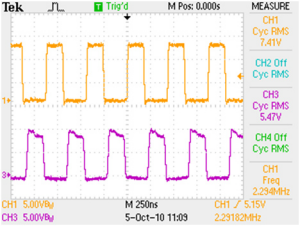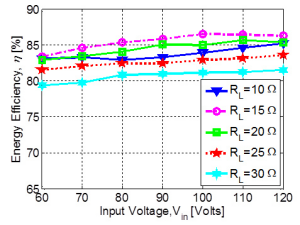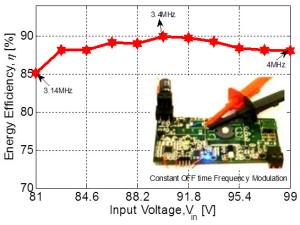High frequency power converters
There is a continuous demand to design a low profile, high power density, highly energy efficient and fast dynamic response converters at a reasonable price for many portable appliances such as laptop/ultrabook adapters, iPads etc., The tremendous efforts in the improvement of switching devices such as GaN HEMTs/SiC MOSFETs, SiC diodes lead to the increased switching speeds of power semiconductor devices.
Higher switching frequencies of converter results in reduction of size of the passive elements such as capacitors, inductors, filter components and transformers which lead to compact size, weight, and the increased power density of the converters.
In this regard, the research has been focused on the design and analysis of a high frequency (HF), highly energy efficient isolated AC-DC/DC-DC converters suitable for the above mentioned consumer appliances by using the HF planar power transformers developed in Mid Sweden University. One of the isolated DC-DC converter prototypes using coreless PCB (CLPCB) power/signal transformer and PCB inductors operating in MHz region is illustrated in fig.1. Due to the lack of commercially available high side gate driver above 1MHz frequency, high frequency passive gate drive circuitry suitable for the operating frequency range of 2 – 4 MHz using CLPCB signal transformer is designed and evaluated. The corresponding gate drive signals with (CH3) and without (CH1) signal transformer is shown in fig.2. The energy efficiency of the converter with the coreless PCB transformer technology in the switching frequency range of 2.4 – 2.75 MHz is as shown in fig.3 with the peak energy efficiency of 86.2% and the maximum tested output power of 35W.

Fig.1. HF converter with CLPCB transformers.

Fig.2. Gate signals using CL signal transformer.

Fig.3. Energy efficiency of HF converter.
By using the latest GaN HEMTs, the high frequency power converter capable to operate in the switching frequency range of 3 – 4MHz is designed and evaluated. The maximum tested output power of the converter is 45W with the peak energy efficiency of 92%. Here, the converter is maintained to be operated in zero voltage switching (ZVS) condition in order to obtain the higher energy efficiencies in the MHz switching frequency. The corresponding switching waveforms together with the energy efficiency of unregulated and regulated converters are illustrated fig.4, 5 and 6 respectively. Different modulation techniques suitable for line and load regulation of the HF converter were investigated.

Fig.4. Switching waveforms of HF converter.

Fig.5. Efficiency of unregulated converter.

Fig.6. Efficiency of regulated converter.

